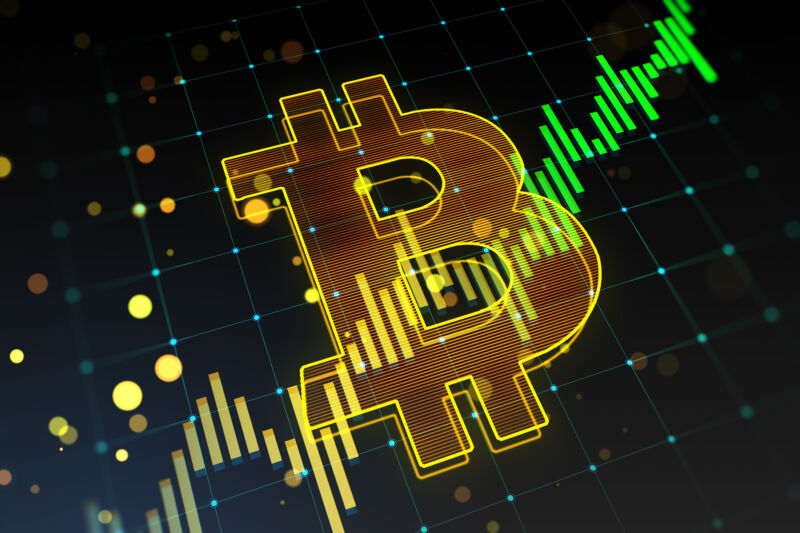
Bitcoin’s price hit a record high Tuesday, surging above $69,000 and notching past its prior peak price of $68,991.85 recorded in 2021.
After bitcoin’s price sunk in 2022 amid a cryptocurrency industry crash, bitcoin’s comeback began in early 2023, Bloomberg reported. But this week’s record price owes a lot to the US Securities and Exchange Commission (SEC) approving spot-bitcoin exchange-traded funds (ETFs) in early January, which funneled more than $7 billion into various bitcoin investment products in less than two months, The New York Times reported.
These ETFs are offered by trusted financial institutions like BlackRock and Fidelity, making it more enticing for the crypto-curious to invest in bitcoin without owning any of the cryptocurrency or understanding any of the associated technology. Instead, they can just buy shares of a collection of digital assets with SEC-required protections against fraud or manipulation.
“Traditional institutions were once sitting out; today, they are here in full force as the principal drivers of the crypto bull market,” Nathan McCauley, CEO and co-founder of Anchorage Digital, told Bloomberg.
Investors already have varied options when choosing between ETFs. According to Coindesk, 11 spot bitcoin ETFs “amassed more than 192,000 bitcoin in holdings” in the month after SEC approvals, on top of 420,000 in holdings owned by Grayscale and nearly 200,000 owned by MicroStrategy, Business Insider reported.
This spares investors risks associated with cryptocurrency exchanges mired by 2022 scandals and bankruptcies, from FTX’s collapse, which led to prison time for co-founder Sam Bankman-Fried, to the SEC’s larger crackdown on exchanges like Coinbase and Binance.
While demand in bitcoin investment products spikes—perhaps pushing bitcoin’s value as high as $500,000, analysts told Business Insider—the amount of available bitcoin is about to drop during a halving event expected to take place April 19, Marketwatch forecasted.
Bitcoin halving events happen approximately every four years. They occur after 210,000 blocks are mined, slashing the reward for mining in half and intended to control the total supply until the maximum number of coins are released, Marketwatch explained.
“The prospect of scarcer bitcoin supply has helped drive up its price,” The Times reported.
But while it’s common for bitcoin’s price to rise around halving events, Marketwatch noted that historically, the months before a halving do not see the spikes in prices occurring now. In what Bloomberg described as an “ironic twist,” it would appear that the SEC—which typically restricts cryptocurrency flows—could become the force helping the crypto industry “turn the page” from a crypto winter that some skeptics predicted cryptocurrencies may never recover from.
Of course, other more optimistic analysts predicted that ETFs would drive bitcoin to these new heights, Business Insider reported.
Prices of other cryptocurrencies, including ether, solana, and dogecoin, have also risen this year, Business Insider reported, with spiking interest potentially driven by the possibility that the SEC could approve investment products tied to other cryptocurrencies. Optimism has seemingly remained high since February, when the value of the cryptocurrency market bounced back to $2 trillion—conditions last seen in April 2022, Business Insider reported.
If the SEC does end up approving more cryptocurrency investment products, it likely won’t be because SEC chair Gary Gensler is in any rush to do so, though.
In a press release announcing the approvals last January, Gensler noted that the SEC had resisted “the listing and trading of a number of spot bitcoin exchange-traded product (ETP) shares.” It was only after a court ruling where “the Commission failed to adequately explain its reasoning in disapproving” a “listing and trading of Grayscale’s proposed ETP” that the SEC felt that approving these investment funds and products would be “the most sustainable path forward.”
Despite immediately granting approvals for 10 ETPs, Gensler warned investors that the SEC still views bitcoin as a “volatile asset” linked to “illicit activity” like ransomware, money laundering, sanction evasion, and terrorist financing.
“While we approved the listing and trading of certain spot bitcoin ETP shares today, we did not approve or endorse bitcoin,” Gensler said. “Investors should remain cautious about the myriad risks associated with bitcoin and products whose value is tied to crypto.”


